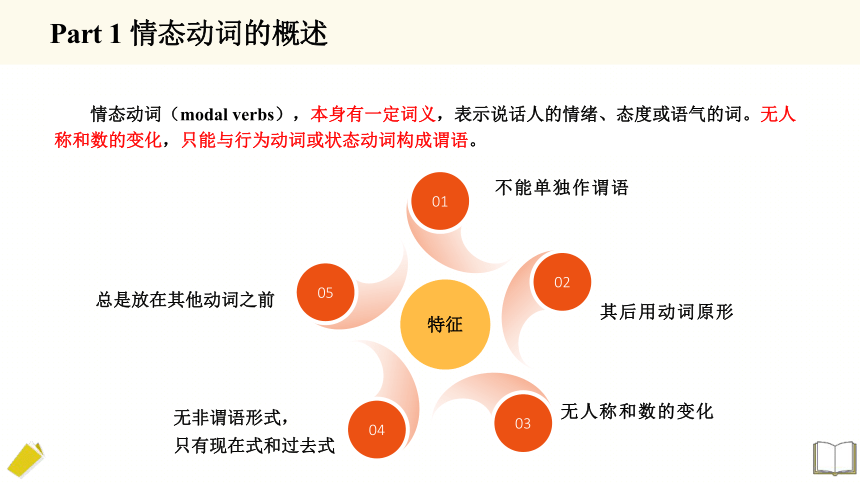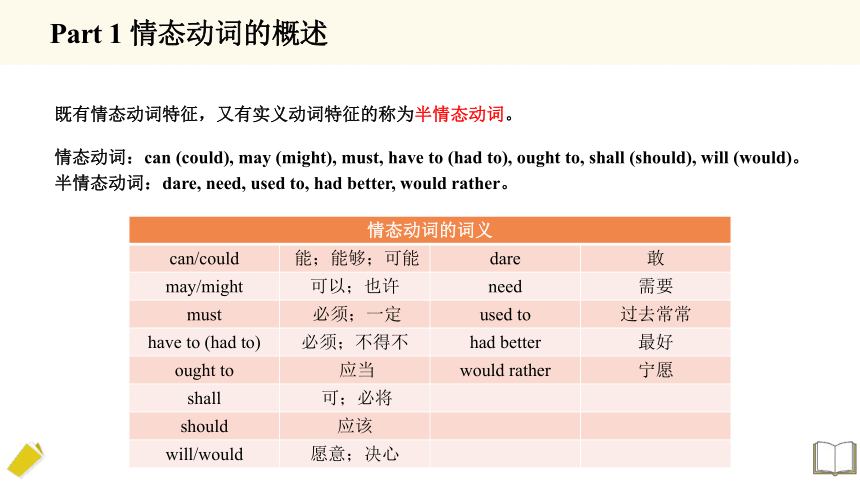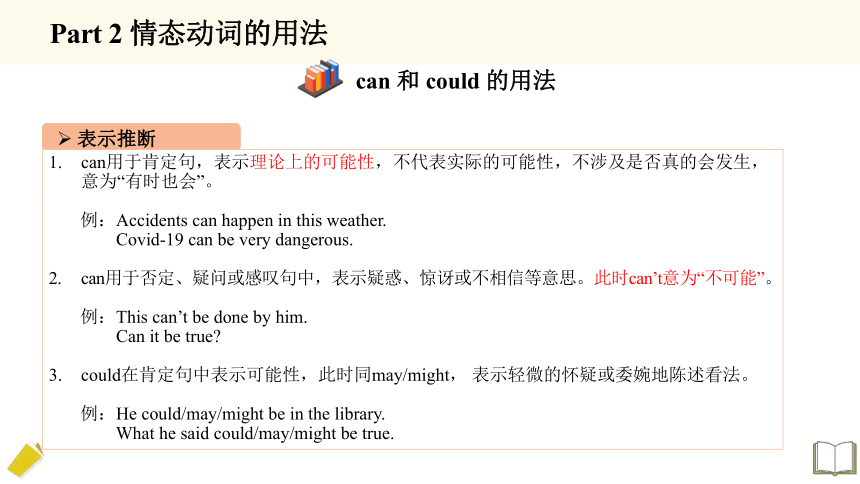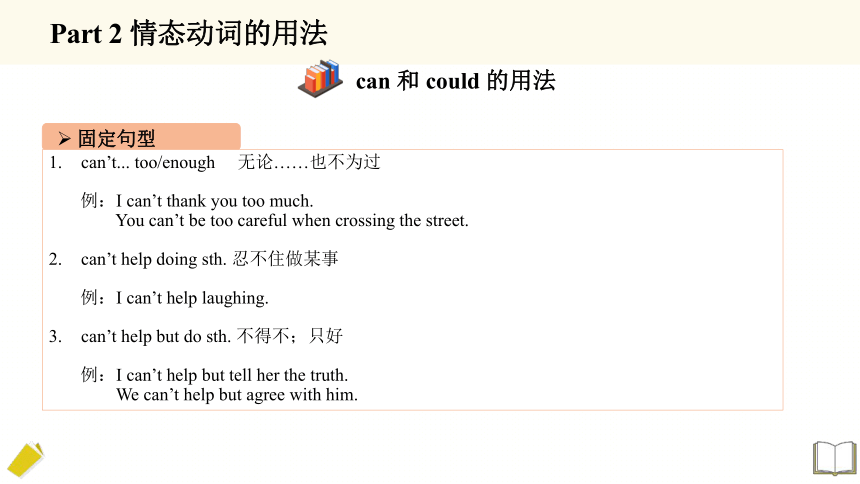2022届高考英语语法专项之情态动词及虚拟语气课件(31张)
文档属性
| 名称 | 2022届高考英语语法专项之情态动词及虚拟语气课件(31张) |

|
|
| 格式 | pptx | ||
| 文件大小 | 29.3MB | ||
| 资源类型 | 教案 | ||
| 版本资源 | 通用版 | ||
| 科目 | 英语 | ||
| 更新时间 | 2022-05-25 12:47:03 | ||
图片预览












文档简介
情态动词与虚拟语气
2022一轮复习——语法专项
CONTENTS
目录
情态动词的概述
01
情态动词的用法
02
虚拟语气
03
Part 1 情态动词的概述
Part 1 情态动词的概述
情态动词(modal verbs),本身有一定词义,表示说话人的情绪、态度或语气的词。无人称和数的变化,只能与行为动词或状态动词构成谓语。
特征
其后用动词原形
总是放在其他动词之前
无人称和数的变化
无非谓语形式,
只有现在式和过去式
05
01
02
03
04
不能单独作谓语
既有情态动词特征,又有实义动词特征的称为半情态动词。
情态动词:can (could), may (might), must, have to (had to), ought to, shall (should), will (would)。
半情态动词:dare, need, used to, had better, would rather。
Part 1 情态动词的概述
{5C22544A-7EE6-4342-B048-85BDC9FD1C3A}情态动词的词义
can/could
能;能够;可能
dare
敢
may/might
可以;也许
need
需要
must
必须;一定
used to
过去常常
have to (had to)
必须;不得不
had better
最好
ought to
应当
would rather
宁愿
shall
可;必将
should
应该
will/would
愿意;决心
Part 2 情态动词的用法
Part 2 情态动词的用法
can 和 could 的用法
表示能力
意为“能够”,can表示现在一般的能力,could表示过去一般的能力。
例:Mary can speak 3 languages.
Tom could sing English songs at the age of 6.
表示请求或允许
意为“可否;可以”,在一般疑问句中could 可代替can,但比can语气更委婉,答语要用can。在陈述句中表示“允许(做某事)”,不用could。
例:—Can/Could you help me? —Yes, I can.
You can have the book when I have finished it.
You can’t pick flowers in this park.
can 和 could 的用法
Part 2 情态动词的用法
表示推断
can用于肯定句,表示理论上的可能性,不代表实际的可能性,不涉及是否真的会发生,意为“有时也会”。
例:Accidents can happen in this weather.
Covid-19 can be very dangerous.
can用于否定、疑问或感叹句中,表示疑惑、惊讶或不相信等意思。此时can’t意为“不可能”。
例:This can’t be done by him.
Can it be true?
could在肯定句中表示可能性,此时同may/might, 表示轻微的怀疑或委婉地陈述看法。
例:He could/may/might be in the library.
What he said could/may/might be true.
Part 2 情态动词的用法
can 和 could 的用法
固定句型
can’t... too/enough 无论……也不为过
例:I can’t thank you too much.
You can’t be too careful when crossing the street.
can’t help doing sth. 忍不住做某事
例:I can’t help laughing.
can’t help but do sth. 不得不;只好
例:I can’t help but tell her the truth.
We can’t help but agree with him.
Part 2 情态动词的用法
表示请求或允许
意为“可以”,might 为may的过去式。“May I... ”用于征询对方许可,在文体上比较正式,在语气上比较客气。
例:May I use your pen?
You may leave the book where it was.
表示推断
意为“可能”,用于推测,暗指不确定。may not意为“可能不”。
例:The book may be Peter’s.
If you start at once, you may arrive before dark.
may 和 might 的用法
Part 2 情态动词的用法
表示祝愿
常用于祈使句。
例:May you succeed!
May we never forget each other!
固定句型
may/might as well do意为“不妨,还是做……为好”,=had better,用于提出建议。
例:You may as well give him the letter.
You might as well stay at home tonight.
may/might well do =be very likely to do,意为“很可能”。
例:He has changed so much, you might well not recognize him.
She might well be proud of her son.
may 和 might 的用法
Part 2 情态动词的用法
must 的用法
表示必要性
意为“必须”,其否定形式为needn’t/don’t have to。用于第一人称表示说话人有义务,有必要去做某事,用于第二、三人称表示命令或要求某人做某事。
例: I must study for the test.
You must arrive in time.
You needn’t hand in your homework tomorrow.
注意:must表示的是说话人的主观看法,而have to则往往强调客观需要。二者否定意义大
不相同。mustn’t表示禁止, 是说话人强有力的劝告,意为“决不可以;不准;不允
许”,而“don’t have to”意为“没必要”。
Part 2 情态动词的用法
must 的用法
表示坚持
意为“偏要,非要”
例:Why must you be so stubborn?
Must you make so much noise?
If you must smoke, at least you could use an ashtray.
表示推断
意为“一定,准是”,表示有把握的推测。
例:That tall man must be a basketball player.
He must be anxious to know the result.
You must feel tired after a long walk.
Part 2 情态动词的用法
表示推断
ought to表示语气不十分肯定或比较含蓄的推测;should可表示合理的推断或明显的结果,且所期待的事几乎是事实。
例:He ought to be home by now.
It’s 3 o’clock, the football match should begin soon.
表示必要性
ought to与should同义,但语气稍重,should表示劝告、建议、命令,有劝说、敦促的含义,有时也表达一种道义上的责任;shall用于第二、三人称,表示说话人给对方的命令、警告、允诺或威胁,在法律、条约、规章等文件中,表示义务、规定、预言等。
例:You ought to take care of him.
You should treat your friends with more respect.
Each citizen shall carry his identification when travelling.
ought to, shall 和 should 的用法
Part 2 情态动词的用法
ought to, shall 和 should 的用法
表示惊讶、忧虑、惋惜等情绪
should 可以表示惊讶、忧虑、惋惜等情绪,意为“竟然”,ought to 和 shall 不具备该用法。should 在疑问句中,也可以与how,why,who等连用,表示不合理,难以相信,难以理解的事。
例:It’s strange that he should be late. (表示惊讶)
It’s a pity that you should be so careless. (表示惋惜)
Why should we change it when we never use it? (表示不理解)
用在虚拟语气当中
should与表示命令、建议、请求、要求的动词或名词连用,或用于表示与将来事实相反的if 从句中。ought to 和 shall 不具备该用法。
例:He suggested that we (should) start off early the next day.
If he shouldn’t come tomorrow, we would put off the meeting.
Part 2 情态动词的用法
will 和 would 的用法
表示意志、愿望和决心
用于各种人称,表示主语的意志、愿望和决心。
例:I will never do that again. (表示决心)
He will take you home. (表示意愿)
表示推断
意为“想必,大概”,与must,should,ought to等表示推断同义
例:It’s 5 o’clock, Jack will be in Paris now.
It will be snowing in Beijing now.
Part 2 情态动词的用法
will 和 would 的用法
表示请求、建议
与第二人称的一般疑问句连用,表示请求,建议。
例:Will/Would you go with me?
Will/Would you tell me the way to the station?
表示习惯、倾向
多用于第三人称,意为“通常,常常”
例:He will sit by the window for hours doing nothing.
Some birds will fly to the south when the weather gets cold.
用来叙述真理或表示自然规律
用于叙述真理,意为“总是”;表示自然规律,指现在,有时可用现在时。
例:Oil will float on water.
If the pure water is heated to 100℃, it will boil.
Part 2 情态动词的用法
need 和 dare 的用法
{5C22544A-7EE6-4342-B048-85BDC9FD1C3A}分类
用法
例句
实义动词
有人称和数的变化;可直接充当谓语;构成否定句和疑问句要用助动词do,does,did;其后常加to do使用。
He needs to do it.
He doesn’t need to do it.
Does he need to do it?
情态动词
无人称和数的变化;要和表示行为或状态的动词共同构成谓语;构成否定句和疑问句不用助动词;其后加动词原形。
He need do it.
He needn’t do it.
Need he do it?
Part 2 情态动词的用法
used to、had better 和 would rather 的用法
{5C22544A-7EE6-4342-B048-85BDC9FD1C3A}半情态动词
用法
例句
used to
意为“过去常常做”,表示过去的习惯动作或状态,暗指现在已不复如此。只有过去时,在间接引语中形式不变,不能表示现在或将来。
We used to go to the beach, but now we don’t.
had better (not)
意为“最好(不)做”,没有词形变化,即可指现在,也可指将来,后接不带to的不定式。
It’s cold today, you’d better put on a coat when you go out.
would rather
意为“宁愿”,没有词形变化,后接不带to的不定式,可表示“过去意愿做了某事而实际上并未做成”
I would rather watch TV than go to see the film.
Part 2 情态动词的用法
用法总结
{5C22544A-7EE6-4342-B048-85BDC9FD1C3A}用法
情态动词
表示能力
can,could
表示请求、允许
can,could;may,might;will,would
表示推断
can,could;may,might;must;ought to,should;will,would
表示必要性
must;ought to,should,shall;need
表示祝愿
may
表示意志,愿望,决心
will
表示坚持
must
表示习惯
will,would;used to
表示惊讶、忧虑、惋惜等情绪
should
Part 2 情态动词的用法
{5C22544A-7EE6-4342-B048-85BDC9FD1C3A}结构
含义
例句
can/could have done
1. 本来能够做而未做
2. 过去可能会做
John could have posted the letter.
can’t/couldn’t have done
1. 过去不可能做
2. 过去没能够做
He can’t have forgotten it.
may/might have done
也许已经做了
It’s too late, he might have gone to bed.
must have done
准是/一定做了
It must have rained last night, for the road is quite muddy.
needn’t have done
本来不必做而实际上已经做了
You needn’t have watered the flowers, for it’s going to rain.
should/ought to have done
本来应该做而实际上没有做
You should have started earlier, but you didn’t.
“情态动词+have done”用法一览表
Part 3 虚拟语气
Part 3 虚拟语气
虚拟语气表示说话人的愿望、假设、猜测或建议,而不表示客观存在的事实。虚拟语气通过谓语动词的特殊形式来表示。
虚拟语气
01
if 引导的虚拟语气
05
虚拟语气用在“it is (high) time +that从句”中
02
wish,if only,as if引导的虚拟语气
04
虚拟语气用在“would rather+that从句”中
03
虚拟语气用在主句含“命令、建议、要求”的名词性从句中
Part 3 虚拟语气
If 引导的虚拟语气
{5C22544A-7EE6-4342-B048-85BDC9FD1C3A}
从句谓语形式
主句谓语形式
例句
与现在事实相反
过去式(be动词用were)
would/should/could/might+动词原形
If I were you, I would seize the chance.
与过去事实相反
had+过去分词
would/should/could/might+have done
If you had taken my advice, you wouldn’t have failed.
与将来事实相反
1. 过去式
2. should+动词原形
3. were to+动词原形
would/should/could/might+动词原形
If he shouldn’t come tomorrow, we would put off the meeting.
Part 3 虚拟语气
注意1:错综时间条件句
当条件状语从句表示的行为和主句表示的行为所发生的的时间不一致时,动词的形式要根据它所表示的时间来调整。
如:
条件句
If you had taken the medicine,
(表过去,与过去事实相反,用过去完成时)
结果句
you would feel better now.
(表现在,与现在事实相反,用过去将来时)
条件句
If the island were still a tourist attraction,
(表现在,与现在事实相反,用过去时)
结果句
the earthquake would have caught more deaths .
(表过去,与过去事实相反,用过去将来完成时)
Part 3 虚拟语气
注意2:if 省略的情况
在if 引导的非真实条件从句中,谓语含were,had,should,可将if 省略,但需将were,had,should提到主语之前。
如:
If I were at school again, I would study harder.
Were I at school again, I would study harder.
If I had known you were here, I would come earlier.
Had I known you were here, I would come earlier.
Part 3 虚拟语气
注意3:含蓄条件句
有时假设的条件并不总是通过if 引导的,而是隐含在某些词、短语或上下文中,此种句子为“含蓄条件句”,常见的词或短语有:without,in case,but for,for fear that,otherwise。
如:
If it had not been for your help, we couldn’t have finished the work ahead of time.
= Without your help / But for your help, we couldn’t have finished the work ahead of time.
Without air, there would be no living things.
In that case, we could have done the work better
Part 3 虚拟语气
wish,if only,as if 引导的虚拟语气
{5C22544A-7EE6-4342-B048-85BDC9FD1C3A}条件
从句谓语形式
例句
从句谓语动词与主句谓语动词同时发生
过去式(be动词用were)
If only/How I wish I were a flying bird.
从句谓语动词先于主句谓语动词发生
had+过去分词
If only I had seen the film!
He speaks English so fluently as if he had stayed in America for a long time.
从句谓语动词后于主句谓语动词发生
would+动词原形
He learns English so hard as if he would go abroad.
注意:
当句子所叙述的是真实的或极有可能发生的或存在的事实时,as if 从句要用陈述语气。
例:It seems as if it is going to rain.
He walks as if he is drunk.
Part 3 虚拟语气
虚拟语气用在主句含“命令、建议、要求”的名词性从句中
{5C22544A-7EE6-4342-B048-85BDC9FD1C3A}类别
名词性从句谓语动词形式
例句
一坚持:insist
should+动词原形,should 可以省略
He suggested that we (should) start off early the next day. (宾语从句)
His suggestion was that we (should) start off early the next day. (同位语从句)
It was suggested that we (should) start off early the next day. (主语从句)
二命令:order,command
四建议:advise,suggest,propose,recommend
五要求:require,request,demand,desire,urge
注意:
suggest作“暗示”,insist作“坚持说”时, 由于后面宾语从句谓语动词不再后于suggest和insist发生,故宾语从句的谓语动词不再使用虚拟语气形式(should+动词原形),而使用陈述语气。
例:The smile on his face suggested that he was satisfied with our work.
The man insisted that he had never stolen the money.
Part 3 虚拟语气
虚拟语气用在“would rather+that从句”中
{5C22544A-7EE6-4342-B048-85BDC9FD1C3A}条件
从句谓语形式
例句
对现在或将来的虚拟
过去式(be用were)
I’d rather they didn’t hear of the news.
对过去的虚拟
had+过去分词
I’d rather I hadn’t told him the bad news.
虚拟语气用在“It is (high) time+that从句”中
{5C22544A-7EE6-4342-B048-85BDC9FD1C3A}that从句谓语形式
例句
过去式或“should+动词原形”,且should不能省略
It is (high) time that you went/should go to school.
Part 3 虚拟语气
虚拟语气用在“It is necessary等+that从句”中
虚拟语气用在目的状语从句中
在“It is necessary/important/vital/surprising/strange/natural/a pity/essential等+that从句”中,that从句的谓语动词用“should+动词原形”,should 可以省略。should表示感彩,意为“竟然”。
例:It is strange that the meeting (should) be put off till next week.
It is a pity that you (should) have to leave.
由in case,for fear that,in order that,so that等引导的目的状语从句,其谓语动词用“could/should/might/would+动词原形”,表示虚拟。
例:They left early for fear that they would meet him.
I gave you a map so that you wouldn’t get lost.
2022一轮复习——语法专项
CONTENTS
目录
情态动词的概述
01
情态动词的用法
02
虚拟语气
03
Part 1 情态动词的概述
Part 1 情态动词的概述
情态动词(modal verbs),本身有一定词义,表示说话人的情绪、态度或语气的词。无人称和数的变化,只能与行为动词或状态动词构成谓语。
特征
其后用动词原形
总是放在其他动词之前
无人称和数的变化
无非谓语形式,
只有现在式和过去式
05
01
02
03
04
不能单独作谓语
既有情态动词特征,又有实义动词特征的称为半情态动词。
情态动词:can (could), may (might), must, have to (had to), ought to, shall (should), will (would)。
半情态动词:dare, need, used to, had better, would rather。
Part 1 情态动词的概述
{5C22544A-7EE6-4342-B048-85BDC9FD1C3A}情态动词的词义
can/could
能;能够;可能
dare
敢
may/might
可以;也许
need
需要
must
必须;一定
used to
过去常常
have to (had to)
必须;不得不
had better
最好
ought to
应当
would rather
宁愿
shall
可;必将
should
应该
will/would
愿意;决心
Part 2 情态动词的用法
Part 2 情态动词的用法
can 和 could 的用法
表示能力
意为“能够”,can表示现在一般的能力,could表示过去一般的能力。
例:Mary can speak 3 languages.
Tom could sing English songs at the age of 6.
表示请求或允许
意为“可否;可以”,在一般疑问句中could 可代替can,但比can语气更委婉,答语要用can。在陈述句中表示“允许(做某事)”,不用could。
例:—Can/Could you help me? —Yes, I can.
You can have the book when I have finished it.
You can’t pick flowers in this park.
can 和 could 的用法
Part 2 情态动词的用法
表示推断
can用于肯定句,表示理论上的可能性,不代表实际的可能性,不涉及是否真的会发生,意为“有时也会”。
例:Accidents can happen in this weather.
Covid-19 can be very dangerous.
can用于否定、疑问或感叹句中,表示疑惑、惊讶或不相信等意思。此时can’t意为“不可能”。
例:This can’t be done by him.
Can it be true?
could在肯定句中表示可能性,此时同may/might, 表示轻微的怀疑或委婉地陈述看法。
例:He could/may/might be in the library.
What he said could/may/might be true.
Part 2 情态动词的用法
can 和 could 的用法
固定句型
can’t... too/enough 无论……也不为过
例:I can’t thank you too much.
You can’t be too careful when crossing the street.
can’t help doing sth. 忍不住做某事
例:I can’t help laughing.
can’t help but do sth. 不得不;只好
例:I can’t help but tell her the truth.
We can’t help but agree with him.
Part 2 情态动词的用法
表示请求或允许
意为“可以”,might 为may的过去式。“May I... ”用于征询对方许可,在文体上比较正式,在语气上比较客气。
例:May I use your pen?
You may leave the book where it was.
表示推断
意为“可能”,用于推测,暗指不确定。may not意为“可能不”。
例:The book may be Peter’s.
If you start at once, you may arrive before dark.
may 和 might 的用法
Part 2 情态动词的用法
表示祝愿
常用于祈使句。
例:May you succeed!
May we never forget each other!
固定句型
may/might as well do意为“不妨,还是做……为好”,=had better,用于提出建议。
例:You may as well give him the letter.
You might as well stay at home tonight.
may/might well do =be very likely to do,意为“很可能”。
例:He has changed so much, you might well not recognize him.
She might well be proud of her son.
may 和 might 的用法
Part 2 情态动词的用法
must 的用法
表示必要性
意为“必须”,其否定形式为needn’t/don’t have to。用于第一人称表示说话人有义务,有必要去做某事,用于第二、三人称表示命令或要求某人做某事。
例: I must study for the test.
You must arrive in time.
You needn’t hand in your homework tomorrow.
注意:must表示的是说话人的主观看法,而have to则往往强调客观需要。二者否定意义大
不相同。mustn’t表示禁止, 是说话人强有力的劝告,意为“决不可以;不准;不允
许”,而“don’t have to”意为“没必要”。
Part 2 情态动词的用法
must 的用法
表示坚持
意为“偏要,非要”
例:Why must you be so stubborn?
Must you make so much noise?
If you must smoke, at least you could use an ashtray.
表示推断
意为“一定,准是”,表示有把握的推测。
例:That tall man must be a basketball player.
He must be anxious to know the result.
You must feel tired after a long walk.
Part 2 情态动词的用法
表示推断
ought to表示语气不十分肯定或比较含蓄的推测;should可表示合理的推断或明显的结果,且所期待的事几乎是事实。
例:He ought to be home by now.
It’s 3 o’clock, the football match should begin soon.
表示必要性
ought to与should同义,但语气稍重,should表示劝告、建议、命令,有劝说、敦促的含义,有时也表达一种道义上的责任;shall用于第二、三人称,表示说话人给对方的命令、警告、允诺或威胁,在法律、条约、规章等文件中,表示义务、规定、预言等。
例:You ought to take care of him.
You should treat your friends with more respect.
Each citizen shall carry his identification when travelling.
ought to, shall 和 should 的用法
Part 2 情态动词的用法
ought to, shall 和 should 的用法
表示惊讶、忧虑、惋惜等情绪
should 可以表示惊讶、忧虑、惋惜等情绪,意为“竟然”,ought to 和 shall 不具备该用法。should 在疑问句中,也可以与how,why,who等连用,表示不合理,难以相信,难以理解的事。
例:It’s strange that he should be late. (表示惊讶)
It’s a pity that you should be so careless. (表示惋惜)
Why should we change it when we never use it? (表示不理解)
用在虚拟语气当中
should与表示命令、建议、请求、要求的动词或名词连用,或用于表示与将来事实相反的if 从句中。ought to 和 shall 不具备该用法。
例:He suggested that we (should) start off early the next day.
If he shouldn’t come tomorrow, we would put off the meeting.
Part 2 情态动词的用法
will 和 would 的用法
表示意志、愿望和决心
用于各种人称,表示主语的意志、愿望和决心。
例:I will never do that again. (表示决心)
He will take you home. (表示意愿)
表示推断
意为“想必,大概”,与must,should,ought to等表示推断同义
例:It’s 5 o’clock, Jack will be in Paris now.
It will be snowing in Beijing now.
Part 2 情态动词的用法
will 和 would 的用法
表示请求、建议
与第二人称的一般疑问句连用,表示请求,建议。
例:Will/Would you go with me?
Will/Would you tell me the way to the station?
表示习惯、倾向
多用于第三人称,意为“通常,常常”
例:He will sit by the window for hours doing nothing.
Some birds will fly to the south when the weather gets cold.
用来叙述真理或表示自然规律
用于叙述真理,意为“总是”;表示自然规律,指现在,有时可用现在时。
例:Oil will float on water.
If the pure water is heated to 100℃, it will boil.
Part 2 情态动词的用法
need 和 dare 的用法
{5C22544A-7EE6-4342-B048-85BDC9FD1C3A}分类
用法
例句
实义动词
有人称和数的变化;可直接充当谓语;构成否定句和疑问句要用助动词do,does,did;其后常加to do使用。
He needs to do it.
He doesn’t need to do it.
Does he need to do it?
情态动词
无人称和数的变化;要和表示行为或状态的动词共同构成谓语;构成否定句和疑问句不用助动词;其后加动词原形。
He need do it.
He needn’t do it.
Need he do it?
Part 2 情态动词的用法
used to、had better 和 would rather 的用法
{5C22544A-7EE6-4342-B048-85BDC9FD1C3A}半情态动词
用法
例句
used to
意为“过去常常做”,表示过去的习惯动作或状态,暗指现在已不复如此。只有过去时,在间接引语中形式不变,不能表示现在或将来。
We used to go to the beach, but now we don’t.
had better (not)
意为“最好(不)做”,没有词形变化,即可指现在,也可指将来,后接不带to的不定式。
It’s cold today, you’d better put on a coat when you go out.
would rather
意为“宁愿”,没有词形变化,后接不带to的不定式,可表示“过去意愿做了某事而实际上并未做成”
I would rather watch TV than go to see the film.
Part 2 情态动词的用法
用法总结
{5C22544A-7EE6-4342-B048-85BDC9FD1C3A}用法
情态动词
表示能力
can,could
表示请求、允许
can,could;may,might;will,would
表示推断
can,could;may,might;must;ought to,should;will,would
表示必要性
must;ought to,should,shall;need
表示祝愿
may
表示意志,愿望,决心
will
表示坚持
must
表示习惯
will,would;used to
表示惊讶、忧虑、惋惜等情绪
should
Part 2 情态动词的用法
{5C22544A-7EE6-4342-B048-85BDC9FD1C3A}结构
含义
例句
can/could have done
1. 本来能够做而未做
2. 过去可能会做
John could have posted the letter.
can’t/couldn’t have done
1. 过去不可能做
2. 过去没能够做
He can’t have forgotten it.
may/might have done
也许已经做了
It’s too late, he might have gone to bed.
must have done
准是/一定做了
It must have rained last night, for the road is quite muddy.
needn’t have done
本来不必做而实际上已经做了
You needn’t have watered the flowers, for it’s going to rain.
should/ought to have done
本来应该做而实际上没有做
You should have started earlier, but you didn’t.
“情态动词+have done”用法一览表
Part 3 虚拟语气
Part 3 虚拟语气
虚拟语气表示说话人的愿望、假设、猜测或建议,而不表示客观存在的事实。虚拟语气通过谓语动词的特殊形式来表示。
虚拟语气
01
if 引导的虚拟语气
05
虚拟语气用在“it is (high) time +that从句”中
02
wish,if only,as if引导的虚拟语气
04
虚拟语气用在“would rather+that从句”中
03
虚拟语气用在主句含“命令、建议、要求”的名词性从句中
Part 3 虚拟语气
If 引导的虚拟语气
{5C22544A-7EE6-4342-B048-85BDC9FD1C3A}
从句谓语形式
主句谓语形式
例句
与现在事实相反
过去式(be动词用were)
would/should/could/might+动词原形
If I were you, I would seize the chance.
与过去事实相反
had+过去分词
would/should/could/might+have done
If you had taken my advice, you wouldn’t have failed.
与将来事实相反
1. 过去式
2. should+动词原形
3. were to+动词原形
would/should/could/might+动词原形
If he shouldn’t come tomorrow, we would put off the meeting.
Part 3 虚拟语气
注意1:错综时间条件句
当条件状语从句表示的行为和主句表示的行为所发生的的时间不一致时,动词的形式要根据它所表示的时间来调整。
如:
条件句
If you had taken the medicine,
(表过去,与过去事实相反,用过去完成时)
结果句
you would feel better now.
(表现在,与现在事实相反,用过去将来时)
条件句
If the island were still a tourist attraction,
(表现在,与现在事实相反,用过去时)
结果句
the earthquake would have caught more deaths .
(表过去,与过去事实相反,用过去将来完成时)
Part 3 虚拟语气
注意2:if 省略的情况
在if 引导的非真实条件从句中,谓语含were,had,should,可将if 省略,但需将were,had,should提到主语之前。
如:
If I were at school again, I would study harder.
Were I at school again, I would study harder.
If I had known you were here, I would come earlier.
Had I known you were here, I would come earlier.
Part 3 虚拟语气
注意3:含蓄条件句
有时假设的条件并不总是通过if 引导的,而是隐含在某些词、短语或上下文中,此种句子为“含蓄条件句”,常见的词或短语有:without,in case,but for,for fear that,otherwise。
如:
If it had not been for your help, we couldn’t have finished the work ahead of time.
= Without your help / But for your help, we couldn’t have finished the work ahead of time.
Without air, there would be no living things.
In that case, we could have done the work better
Part 3 虚拟语气
wish,if only,as if 引导的虚拟语气
{5C22544A-7EE6-4342-B048-85BDC9FD1C3A}条件
从句谓语形式
例句
从句谓语动词与主句谓语动词同时发生
过去式(be动词用were)
If only/How I wish I were a flying bird.
从句谓语动词先于主句谓语动词发生
had+过去分词
If only I had seen the film!
He speaks English so fluently as if he had stayed in America for a long time.
从句谓语动词后于主句谓语动词发生
would+动词原形
He learns English so hard as if he would go abroad.
注意:
当句子所叙述的是真实的或极有可能发生的或存在的事实时,as if 从句要用陈述语气。
例:It seems as if it is going to rain.
He walks as if he is drunk.
Part 3 虚拟语气
虚拟语气用在主句含“命令、建议、要求”的名词性从句中
{5C22544A-7EE6-4342-B048-85BDC9FD1C3A}类别
名词性从句谓语动词形式
例句
一坚持:insist
should+动词原形,should 可以省略
He suggested that we (should) start off early the next day. (宾语从句)
His suggestion was that we (should) start off early the next day. (同位语从句)
It was suggested that we (should) start off early the next day. (主语从句)
二命令:order,command
四建议:advise,suggest,propose,recommend
五要求:require,request,demand,desire,urge
注意:
suggest作“暗示”,insist作“坚持说”时, 由于后面宾语从句谓语动词不再后于suggest和insist发生,故宾语从句的谓语动词不再使用虚拟语气形式(should+动词原形),而使用陈述语气。
例:The smile on his face suggested that he was satisfied with our work.
The man insisted that he had never stolen the money.
Part 3 虚拟语气
虚拟语气用在“would rather+that从句”中
{5C22544A-7EE6-4342-B048-85BDC9FD1C3A}条件
从句谓语形式
例句
对现在或将来的虚拟
过去式(be用were)
I’d rather they didn’t hear of the news.
对过去的虚拟
had+过去分词
I’d rather I hadn’t told him the bad news.
虚拟语气用在“It is (high) time+that从句”中
{5C22544A-7EE6-4342-B048-85BDC9FD1C3A}that从句谓语形式
例句
过去式或“should+动词原形”,且should不能省略
It is (high) time that you went/should go to school.
Part 3 虚拟语气
虚拟语气用在“It is necessary等+that从句”中
虚拟语气用在目的状语从句中
在“It is necessary/important/vital/surprising/strange/natural/a pity/essential等+that从句”中,that从句的谓语动词用“should+动词原形”,should 可以省略。should表示感彩,意为“竟然”。
例:It is strange that the meeting (should) be put off till next week.
It is a pity that you (should) have to leave.
由in case,for fear that,in order that,so that等引导的目的状语从句,其谓语动词用“could/should/might/would+动词原形”,表示虚拟。
例:They left early for fear that they would meet him.
I gave you a map so that you wouldn’t get lost.
